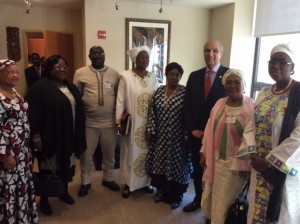Ministers advocate measures against negative Ebola impact on women in West Africa
ECOWAS Ministers in charge of Women Affairs and Gender have expressed total commitment to the complete eradication of the Ebola Virus Disease (EVD) in the region, through various measures including by alleviating the socio-economic, humanitarian, security and cultural consequences of the disease on women.
At a meeting organized by the ECOWAS Commission themed: “Gender and Ebola, the impact of the disease on women in West Africa,” on the occasion of the 59th Session of the UN Commission on the Status of Women, in New York on 13th March 2015, the ministers lamented the negative effects of the EVD on the progress made by the West African Community gender equality and regional integration.
They noted that women and children are among the most exposed and vulnerable groups to the disease and stressed the need to reinforce the response measures both at the level of designing of strategies and their implementation.
The ministers highlighted the importance of mainstreaming gender dimension in the fight against Ebola, which has claimed some 10,000 lives from the more than 23,000 reported cases, mainly in the three West African countries of Guinea, Liberia and Sierra Leone.
They called for support to the affected Member States by ECOWAS, UN Women, African Development Bank, the UN Mission for Ebola Emergency Response (UNMEER), the African Union and other partners.
The support, the ministers said, should involve strengthening of national gender promotion mechanisms in the framework of response measures in the short, medium, and long terms;
The ministers also called for the development of synergy of coordinated and harmonized actions through national mechanism of gender promotion, in the framework of the ECOWAS response plan against the EVD.
They further urged ECOWAS, in cooperation with other stakeholders and all actors, to mobilize adequate resources for the coordinated implementation of the ECOWAS Response Plan to EVD, while the international community should continue its medical and financial support to the affected countries.
The ministers further called for the development of policies and programmes that will enhance medical initiatives and the necessary socio-economic gender issues to make EVD history.
They also recommended the up-grading of health systems of all countries in the region, especially Ebola affected countries, to ensure permanent resilience to similar scourges in future and with emphasis on care for widows and orphans.
In addition, the ministers called for support for the health and psycho-social needs of EVD survivors; maintaining of sanitary measures at the borders and in public places, and continuous awareness campaign through women’s groups and youth organizations, for the adoption of sustainable hygiene behaviors.
The ministers also called for the Implementation of special social and economic reintegration programmes in support of women, and vulnerable groups, as well as national programmes for reconstruction and recovery of production activities.
They also urged the strengthening of education, social services and child protection systems of the affected countries with specific measures for the education of children, girls and orphans.




